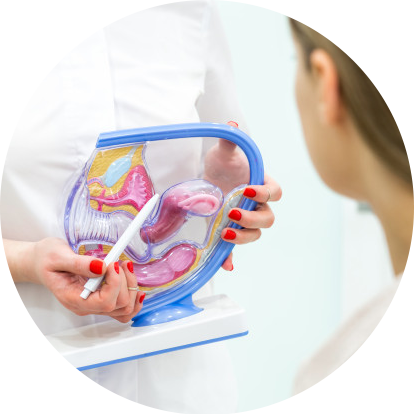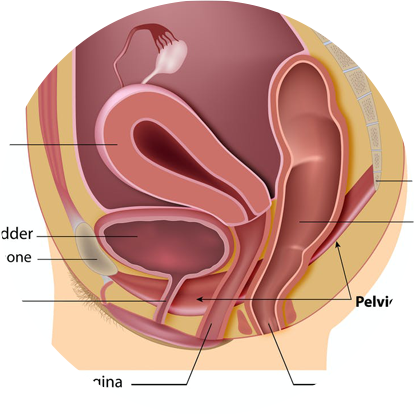Get Help For Female Urinary Incontinence In Singapore
Urinary incontinence is characterised by the involuntary loss of bladder control. While urinary incontinence can happen to anyone, this issue affects twice as many females as males.

Types Of Female Urinary Incontinence
There are several types of urinary incontinence, with the two most common being:
- Stress Incontinence: Stress urinary incontinence surfaces when actions like coughing, sneezing or laughing exert pressure on the pelvic floor muscles. These instances may indicate weakened pelvic support, with the bladder shifting from its normal position. Physiotherapy may help to improve the symptoms, failing which surgery may be considered.
- Urge Incontinence: This condition is characterised by a frequent and intense urge to urinate. Females with urge incontinence may find themselves having to urinate multiple times a night. Besides being a standalone issue, it can also be symptomatic of other conditions such as diabetes or neurological disorders, including Parkinson’s disease or spinal injuries.
Symptoms Of Urinary Incontinence in Females
Understanding the symptoms is key to managing female urinary incontinence. Common indicators include:
- A sudden, intense urge to urinate
- Involuntary leakage, which can occur when laughing, coughing, sneezing, or exercising
- Needing to urinate more often than usual
- Frequent nighttime urination
- Leakage that occurs shortly after urination
- Feeling as though the bladder is not completely empty
- Constant feeling of wetness
These symptoms may vary in severity and resemble other medical conditions. However, if any of these signs resonate with your experiences, exploring the causes of urinary incontinence and seeking appropriate help in Singapore can be the first step towards improvement.
Causes of Urinary Incontinence in Females
Urinary incontinence in females is a common concern, often linked to various stages of life, such as pregnancy, childbirth, and menopause, alongside lifestyle factors like obesity. Understanding these causes is the first step towards effective management and treatment.

Pregnancy
Pregnancy brings about profound changes in the female body. The increased weight and the pressure exerted on the abdominal cavity by the growing baby can lead to what is known as stress incontinence for pregnant women. This is where activities that can exert pressure on the abdomen, such as coughing or sneezing, may trigger urinary leakage. During pregnancy, the body also undergoes hormonal fluctuations that may temporarily weaken pelvic floor muscles, contributing to incontinence.
Childbirth
Following pregnancy, childbirth presents its challenges, particularly vaginal deliveries, which can significantly stretch and strain the pelvic floor muscles. This stretching can result in a weakened support system for the bladder and urethra, leading to a higher likelihood of female urinary incontinence after childbirth. The degree of strain can be influenced by the nature of the delivery and the size of the baby.
Menopause
As women enter menopause, oestrogen levels drop, which can affect the health of the bladder and urethra. This hormonal change can decrease the bladder’s ability to retain urine, thus contributing to urinary incontinence in post-menopausal women. The thinning of the urethra during menopause can also make it more challenging to control urination, leading to leaks.
Obesity
Weight plays a significant role in urinary incontinence in females. Obesity increases the risk of urinary incontinence as additional body weight can add pressure to the pelvic floor muscles. Over time, this constant pressure can weaken these muscles, making it harder to control the bladder.
Understanding the causes of urinary incontinence in females is crucial for addressing the issue. Singapore’s females grappling with this condition can find solace in knowing that these changes do not have to define their quality of life. There are physiotherapy strategies that can help manage symptoms and improve bladder control.
Treatment For Female Urinary Incontinence In Singapore
Female urinary incontinence is a prevalent issue that may affect many women, but with the right physiotherapeutic approach, it can help strengthen pelvic muscles and enhance bladder control. The following are some strategies and exercises that may help improve symptoms of female urinary incontinence:
Kegel Exercises
Kegel exercises comprise techniques that can help to fortify the pelvic floor muscles while managing urinary incontinence. These exercises generally involve repeated contraction and relaxation of the pelvic muscles, which can improve bladder control when performed consistently and correctly. You can execute these Kegel exercises effectively in the comfort of your home anytime.
Squats
Incorporating squats into your exercise regimen can provide dual benefits of functional strength and pelvic floor support. By engaging the broader muscle groups that work alongside the pelvic floor, such as the glutes and adductors, squats can contribute to the pelvic region’s overall stability. The best part is that you can perform these pelvic floor exercises, especially squats, at home.
Bridges
Bridges can also help strengthen your core and pelvic floor muscles. Aside from strengthening your glutes, they also tighten your buttocks and help to reduce back pain. Essentially, they are designed to thicken the deep abdominal muscles while improving muscle coordination, an essential aspect of managing female urinary incontinence.
Jumping Rope
Jumping rope is an exercise that not only serves as a cardiovascular workout but also tests the endurance of the pelvic floor muscles. With or without professional supervision, incorporating jumping rope into your exercise regimen can help to improve the resilience of the muscles involved in bladder control.
Weighted Vaginal Cones
Another way to strengthen the pelvic floor muscles may include the use of weighted vaginal cones, which can assist in active rehabilitation. These cones are inserted into the vagina, and the user must contract the pelvic floor muscles to hold them in place. The added weight provides resistance, thereby strengthening the muscles over time.
Electrical Stimulation Therapy
As an adjunct to physical exercises, electrical stimulation therapy can offer additional support by using electrical currents to stimulate and strengthen the pelvic muscles, which is potentially beneficial for those who find physical exercises challenging.
Frequently Asked Questions About Female Urinary Incontinence
Can urinary incontinence resolve without treatment?
While spontaneous improvement in urinary incontinence symptoms is possible, it’s not a guarantee. In many cases, particularly for female urinary incontinence in Singapore, the condition is often linked to weakened pelvic floor muscles that benefit from targeted exercises.
Implementing lifestyle changes, such as managing fluid intake and practising timed voiding, can help manage symptoms. However, to increase the chances of recovery and to manage symptoms effectively, professional assessment and individualised physiotherapy plans may be provided by physiotherapists. These tailored plans can address the specific causes of urinary incontinence in females, providing a structured path toward improved bladder control.
How to prevent urinary incontinence?
To help prevent the onset or worsening of urinary incontinence in females, taking proactive steps are essential. Consistent pelvic floor exercises, such as Kegels, can help to strengthen the muscles that support bladder control. A nutritious diet rich in fibre can help prevent constipation, a risk factor for incontinence.
Additionally, maintaining a healthy weight reduces pressure on the bladder and pelvic floor muscles, mitigating the risk of developing female urinary incontinence. Lifestyle modifications, including minimising consumption of diuretics like caffeine and alcohol, can also be effective in preventing the symptoms of female urinary incontinence. The physiotherapists can guide you through a preventative regimen tailored to your unique health profile and needs, helping you maintain a strong and healthy pelvic floor.
About Rapid Physiocare
Rapid Physiocare is dedicated to managing female urinary incontinence through specialised physiotherapy techniques in Singapore. With a team committed to quality care, the focus remains on delivering personalised treatments that cater to the distinct needs of patients. Through professional integrity and continuous support, we aim to assist in effective recovery and enhance the well-being of those we serve.

